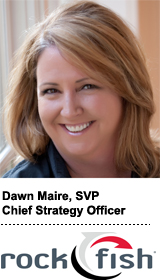 Rockfish has added 100 staffers since its acquisition by WPP Digital in 2011, expanding from its anchor office in Arkansas to Chicago, Austin and Atlanta. Now the agency is in the midst of constructing a digital CRM practice.
Rockfish has added 100 staffers since its acquisition by WPP Digital in 2011, expanding from its anchor office in Arkansas to Chicago, Austin and Atlanta. Now the agency is in the midst of constructing a digital CRM practice.
Citing growing client demand for CRM-related services, Rockfish’s SVP & Chief Strategy Officer Dawn Maire noted a dozen clients had already retained the agency for CRM and loyalty work, which spurred the decision to invest in a more formalized unit. Agencies that specialize in CRM, such as Merkle, and even, marketing services firm Epsilon, in some regard, could be coined as competitors.
“We’re looking to be, first and foremost, a digital innovation partner and to the extent to which we can take that and incorporate CRM and loyalty, we’ll do that,” she commented. While Maire said Rockfish is not looking to be a database-marketing player, “What we do is data-driven, but we’re using alternative sources and looking at different ways to manage that data.
The agency’s practice areas range from analytics and media to search and UX. At present, Maire said 50% of agency work is project-based and the other half is retainer-based, though “we’re gaining on retainer.”
Clients early-in on CRM projects “represent some of the world’s top brands,” noted a Rockfish spokeswoman, although the agency was unable to discuss specifics at large. Rockfish has serviced clients ranging from Walmart and Sam’s Club to P.F. Chang’s and Republican Presidential Campaign Candidate Mitt Romney, over the years.
Formerly chief retail officer for RAPP North America, Maire noted that when building traditional loyalty programs, one of the first questions that gets asked is, “What’s the value proposition?” which leads to a discussion of features, benefits and the eventual foray into focus groups to develop the concept further.
“What I’m starting to see now is kind of this, ‘unprogrammed program,’” Maire said. “If you think about projects like Krispy Kreme’s hot donut app, that’s putting an app into the hands of consumers who, presumably, shop your store and pulling them in just by alerting them that there’s a product or service ready for them.” There’s been a shift to rewrite traditional loyalty rules that once relied on database-fed behavioral attributes, or more transactional data, to bring the consumer back in.
Now, “we want to take traditional media products and create a CRM engine in them,” she added. “This, from my purview, [has an impact] on paid media because you’re not only collecting data and not only driving an impression, but you’re leveraging it as something to get an offer into the palm of the consumer.”
The agency has developed a number of media products within its Rockfish Labs business and innovation incubator. One of them, Media Multiplyer, takes a consumer from banner-ad click to surfacing a personalized promotion — via text or email, for instance. “We’ve built it so you can collect CRM data instead of standard click-through data from within the unit, like email address or mobile phone [number]… so we’re [trying] to build for our clients very valuable databases of hundreds of thousands if not millions of names” from within one ad unit.
The heritage of CRM, both as a technology wedding sales, marketing and service functionalities, as well as strategic acumen to “get the right message to the right customer at the right time” is shifting, namely because of mobility and the demand to turn database-housed information into real-time offers, Maire said.
Because of open social APIs and cloud computing, “I don’t need a complex business model,” Maire said. “I don’t need server farms or database computing. It changes the game.”












